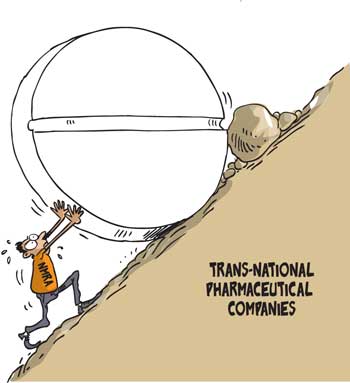Reply To:
Name - Reply Comment
Agents and vested interests sponsored by trans-national pharmaceutical corporations appear to be trying to undermine the National Medicines Regulatory Authority (NMRA) after they tried for about 10 years to delay, derail or dilute the Bill to implement Prof. Senaka Bibile’s essential medicines concept.

Last week media groups working openly against the national or consensus Government gave doctored, twisted or baseless reports about what was happening or not happening in the NMRA.
Some reports claim that Prof. Krishantha Weerasuriya, Chief Executive Officer of the NMRA, had gone overseas on a tour sponsored by trans-national pharmaceutical corporations. The media groups earlier claimed Prof. Weerasuriya had been replaced by Dr. Kamal Jayasinghe, a Director at the Health Ministry. Health Minister Rajitha Senaratne, instead of clarifying matters, added confusion by making contradictory statements at a news conference. While Prof. Weerasuriya returned to work at the NMRA on Monday, two ‘no objection’ letters which Prof. Weerasuriya had refused to approve, were approved by the acting CEO. Both letters had been submitted by one drug company for the import of a brand of eye drops and a disinfectant cream. An inquiry had earlier revealed that the eye drops were to be imported from a non-registered supplier. Earlier Prof. Weerasuriya, widely respected for his skill and integrity, had rejected applications for the import of some drugs. In one case, there was an application to import anti-malaria drugs worth millions of rupees. Dr. Weerasuriya, aware that malaria was well under control, had inquired from the Anti-Malaria Campaign (AMC) whether it needed such drugs. It said there was no need, so perhaps the importer wanted to give a bite to the mosquitoes. Jokes apart, some medical specialists say anti-malaria drugs are now among drugs used for abortions. The CEO rejected this application and also another one for the import of some sleeping tablets because various other varieties were available here.
The NMRA, chaired by Prof. Laal Jayakody, who is the head of the Department of Pharmacology in the Faculty of Medicine, comprises representatives of universities and medical associations. It began working in October last year with hundreds of files containing applications for new registrations of new drugs. However the NMRA’s main role is to check the quality, efficacy, safety, the cost and the need of about 15,000 drugs. This is a complex task, requiring the revival of the National Drug Quality Assurance Laboratory with financial and technical assistance from Japan and Norway which had earlier helped when Prof. Bibile set up this laboratory in the 1970s. At least 50 fully qualified pharmacists will be required and the NMRA could obtain some consultancy services from Dr. Titus de Silva, one of the highest qualified pharmacists in Sri Lanka.
The People’s Movement for the Rights of Patients (PMRP) has appealed to the NMRA to hold regular news conferences, so that the people could be kept informed of the complex issues involved, the hidden agendas and vested interests of groups which still want the TNCs to control the health sector. Unfortunately, some medical consultants also appear to be supporting this along with health ministry officials, not because they think it is the best way, but because of sponsorships, scholarships and other privileges they get at the expense of unsuspecting patients.
President Maithripala Sirisena, a former Health Minister, has acknowledged that he himself was offered bribes by the drug companies. It would be prudent if the President takes a personal interest in the moves to implement the Bibile principle through the NMRA because there are questions about the integrity of Health Ministry officials.
Healing is a vocation, the patient is sacred. To the extent we forget this, the health sector will become a big business and the poor will be left to die.